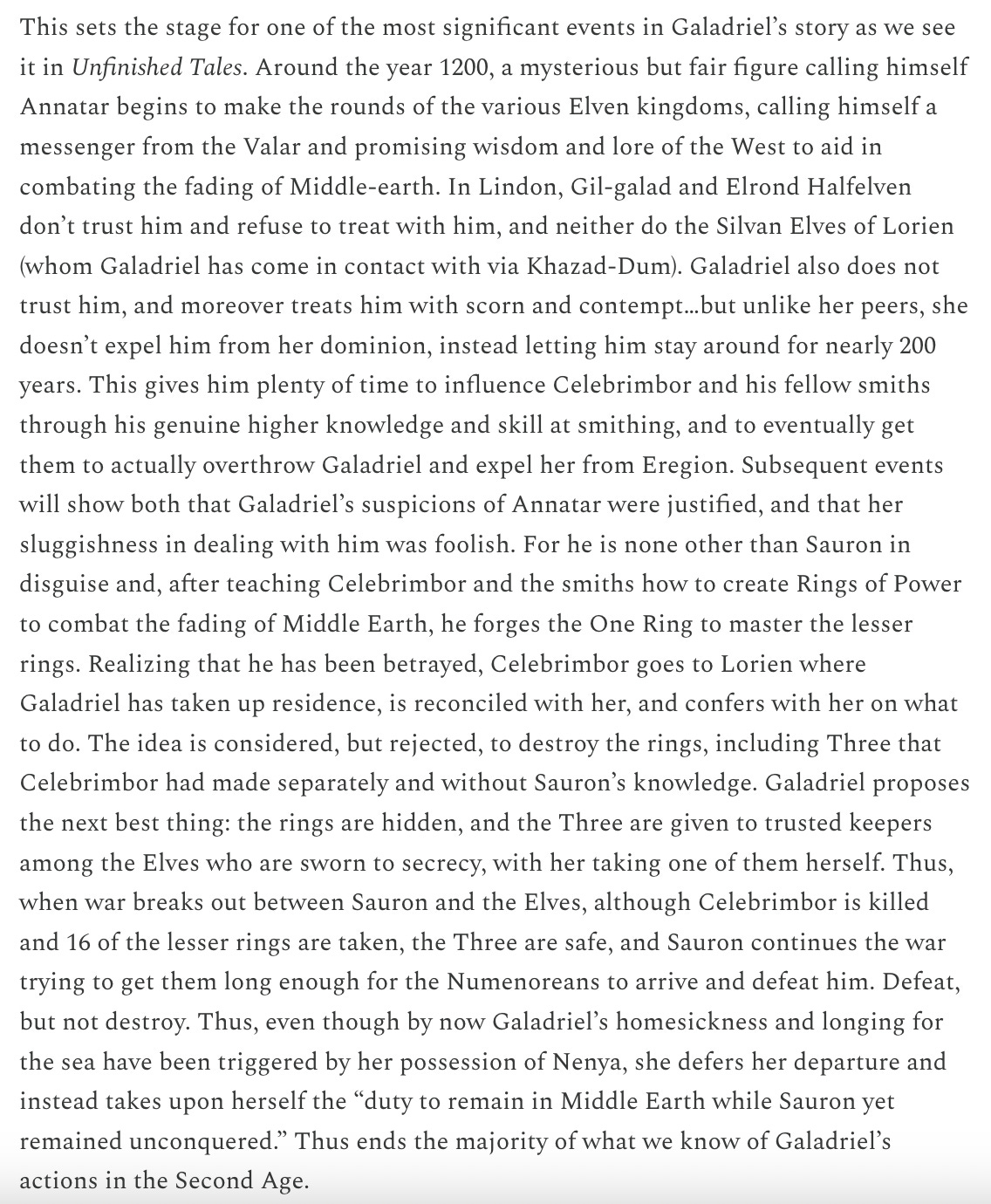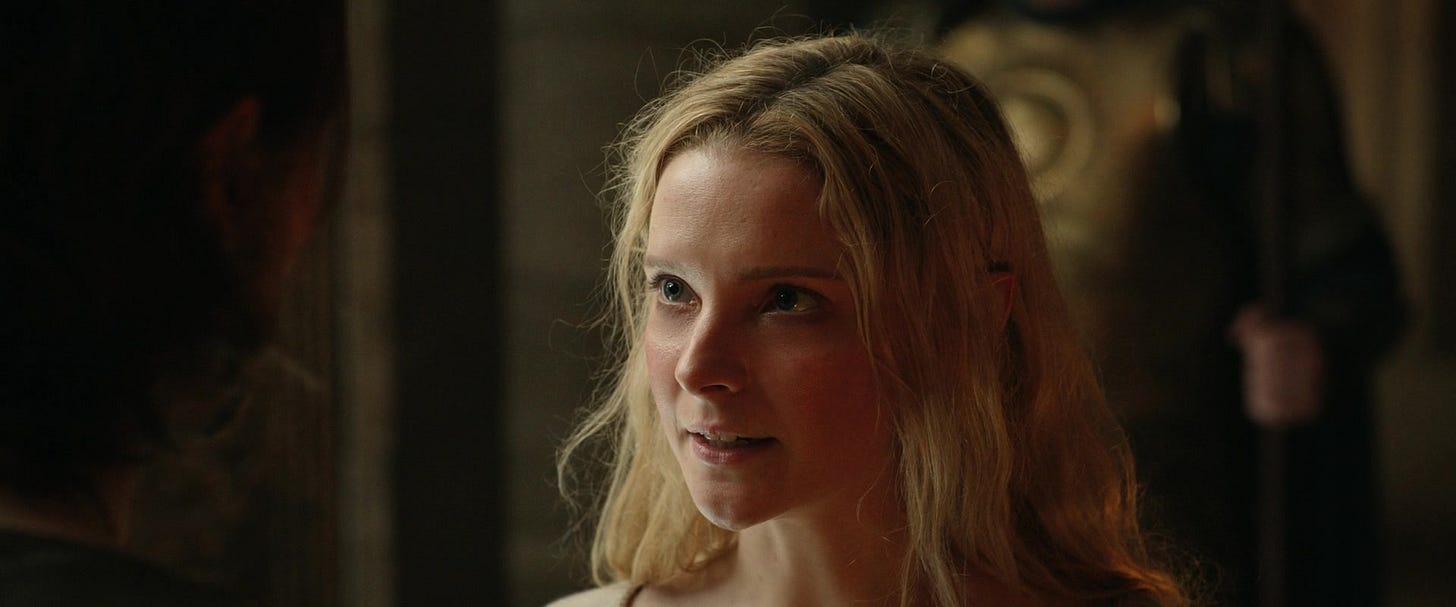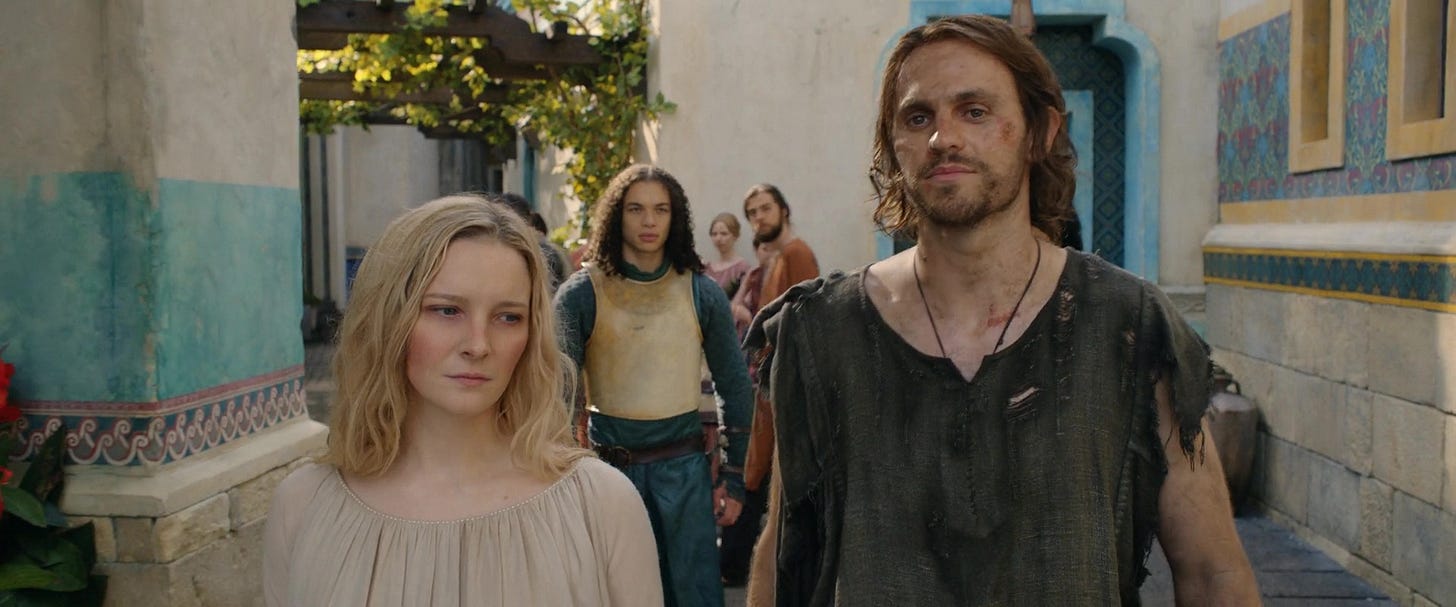The Quality of Mercy
Understanding the nuance and virtue in Galadriel's relationship with Halbrand/Sauron in Season 1 of The Lord of the Rings: The Rings of Power

The quality of mercy is not strain'd.
It droppeth as the gentle rain from heaven
Upon the place beneath…
It blesseth him that gives and him that takes.
'Tis mightiest in the mightiest; it becomes
The thronèd monarch better than his crown.
His scepter shows the force of temporal power,
The attribute to awe and majesty
Wherein doth sit the dread and fear of kings;
But mercy is above this sceptered sway.
It is enthronèd in the hearts of kings;
It is an attribute to God Himself;
And earthly power doth then show likest God's
When mercy seasons justice.
—Portia, The Merchant of Venice
“From her earliest years she had a marvelous gift of insight into the minds of others, but judged them with mercy and understanding, and she withheld her goodwill from none…” Thus does Unfinished Tales describe Galadriel, at least in part, laying the seeds for her ultimately heroic nature even if in this same narrative we read about a proud, singleminded, imperialistic, and aggressive character. It’s this insight, this mercy, this understanding and this compassion that makes her an actual hero, not a villain like Feanor or a tragic figure like Fingolfin or Turgon. And contrary to what some people might think, here are many instances throughout Season 1 of The Lord of the Rings: The Rings of Power where Morfydd Clark’s interpretation of Galadriel shows forth these qualities of mercy and understanding, from almost the first episode of Season 1. Sadly, this grace has not been universally accorded to Galadriel herself by a vocal minority of viewers. And not just the misogynists and Peter Jackson-purists. As a direct result of one really significant instance of her mercy and grace backfiring badly, even those who liked the show have found themselves judging her harshly. I am speaking, of course of her relationship with Halbrand, who repays her kindness and inspiration by showing himself to be Sauron. Some people said that Galadriel was never deceived by Sauron, and therefore RoP's version somehow neutered her wisdom and perception. Clifford Broadbeam of TheOneRing.net brings this up all. The. Time, most recently in an article discussing a bunch of really wacky leaks for Season 2 courtesy of 4chan (subsequently, the good people at Fellowship of Fans disposed of these leaks as pure misinformation). Atheist Liz, a commenter with a large following on the Site Formerly And Forever Known As Twitter, did a complete 180 from arguing how this development is faithful to Tolkien’s spirit to saying that this represented a misogynistic approach to her by showrunners JD Payne and Patrick McCay. Even Steven Greydanus of DecentFilms, although overall guardedly optimistic about the show, felt that Galadriel’s actions in essentially bringing Sauron back to Middle-earth amounted to a dangerous confusion of the designs of the Enemy for the Will of God.
Coming from people who actually do know the written lore (which is more than can be said for many of Galadriel’s critics and enemies) this criticism hurts. It means something. And it speaks well of how these people have clearly done their homework. But this has its own problems. In a way, these people who hold up Galadriel in Unfinished Tales as the standard which Galadriel in Rings of Power fails to meet are making a similar mistake to those people who hold up Cate Blanchett’s Galadriel as the gold standard. Because, if we actually look closely at how Galadriel interacts with Sauron in Unfinished Tales, she…does not actually “make a very splendid figure”. Her pride and shortsightedness that were first manifest as she played her role in the rebellion of the Noldor are very much present in how she treats with Sauron and deals with the question of what to do with the Rings of Power, and the outcome is…not pretty. In contrast, Galadriel in the show fares pretty well, actually, all things considered. I've long considered this one of a few areas where Galadriel in the show is actually improved from Galadriel in the books. While her behavior is in no way perfect, it is in some ways far more understandable; there are clear reasons behind her actions, and they are a credit to her as a noble and inspirational character; and an argument can be made that she is in fact carrying a Divine plan, not only for Middle-earth but also for herself. I’m going to make that argument right now.
We should probably get out of the way the fact that in both the Appendices and The Silmarillion, Galadriel doesn't figure into the story of Sauron deceiving the Elves at all. In those works Gil-galad and Celebrimbor are the only Elvish leaders Sauron meets initially; Gil-galad refuses to treat with him at all, but Celebrimbor is seduced. For Galadriel's role in this story have to turn to Unfinished Tales. And her part is…not all that flattering. Here’s how I summarized this story in “The Sunne In Splendour”, my essay discussing and defending RoP Galadriel’s character:
So, what can we learn from this story? It is simply not true, as some have claimed, that “Galadriel was never deceived by Sauron.” There is a distinct possibility that she was, not seeing Annatar for who he really was even if, like Gil-galad and Elrond, she didn’t trust him fully. It would not have been the first time she was blind like this; for as UT tells us regarding her fraught relationship with Feanor many centuries ago, “In him she sensed a darkness that she hated and feared, but yet she could not discern that this darkness was upon the hearts of all the Noldor, and upon her own.” Christopher Tolkien admits in his notes that he was never able to find out either way whether she saw through Sauron’s disguise or not; or, if she did indeed discern that Annatar was Sauron, why she didn’t do anything about it for 200 years and simply let him…stay in her kingdom. He suggests the possibility that when Sauron posed as a servant of Aule Galadriel, who had previously been a student of both Aule and Yavanna, didn't recognize him and so was instantly suspicious of him. But Christopher then points out that Aule had many servants in the years before the Elves first awoke and came to Valinor, so this explanation doesn't exactly...work. And it still doesn't tell whether Galadriel actually did know Annatar as Sauron, or just didn't like him. And given her dislike, why didn’t she do anything about him? Was she afraid of the power of Celebrimbor and his fellow smiths? If so, not crossing them didn’t work, and Galadriel, the most powerful elf in all Middle Earth, would end up on the losing side of a coup orchestrated by what is essentially a guild of jewelers. Did she think that she was powerful enough to deal with him alone? Not only is that her pride and hubris talking, why did she not go ahead and do it already? And finally, what makes this even worse is the fact that even as Galadriel was going around being unsure of Annatar but being scornful of him, Sauron had taken her measure: “He perceived at once that Galadriel would be his chief obstacle and adversary…” And he acted accordingly, first by attempting to “placate her, bearing her scorn with outward patience and courtesy”, and then by suborning Celebrimbor and the smiths and turning them against her (if indeed he hadn’t started doing so immediately, covering both his bases). So while the wise and perceptive Galadriel was going through a confusing and dangerous lack of insight, the Great Enemy had stolen a march upon her.
Nor is this the only mistake that Galadriel makes. Later in the story, when our “Elven chronicler” (this technically is supposed to be an ancient history that Tolkien was translating) writes of how the option of simply destroying the Rings of Power is considered and rejected, he says “they lacked the strength to do so;” is there a reason why this is considered a failure of will? And since it is Galadriel who proposes the remedy of scattering and hiding the Rings, was it perhaps she who argued against destruction, and if so why? Did her jealousy of Valinor and desire to replicate it in Middle Earth, to “have her cake without eating it” as Tolkien would later write of all the Elves, influence her against making a hard but necessary choice? In conclusion, therefore: Galadriel’s actions regarding Annatar/Sauron, as written by Tolkien himself, are not Galadriel at her best, and directly contribute to Sauron’s growth in power and the resulting disasters that happen, even if she herself never broke the faith. When in The Fellowship of the Ring Galadriel says to Frodo "The love of the Elves for their land and their works is deeper than the deeps of the sea, and their regret is undying and cannot ever wholly be assuaged. Yet they will cast all away rather than submit to Sauron, for they know him now," she is speaking in general terms about the general failing of the Elves that allowed Sauron to first forge the One; but if we interpret the text of UT to read that she was a leader among the Elves in the Second Age, then she is indicting herself for her own failure to deal with Sauron when she could have done so much easier than at the end of the Third Age.
So, the image that RoP Galadriel’s detractors hold her up against doesn’t shine so brightly as it might initially have seemed. But what about RoP Galadriel herself? Why do I state so strongly that she is actually handled better in the show than in Unfinished Tales? I’m glad you asked.
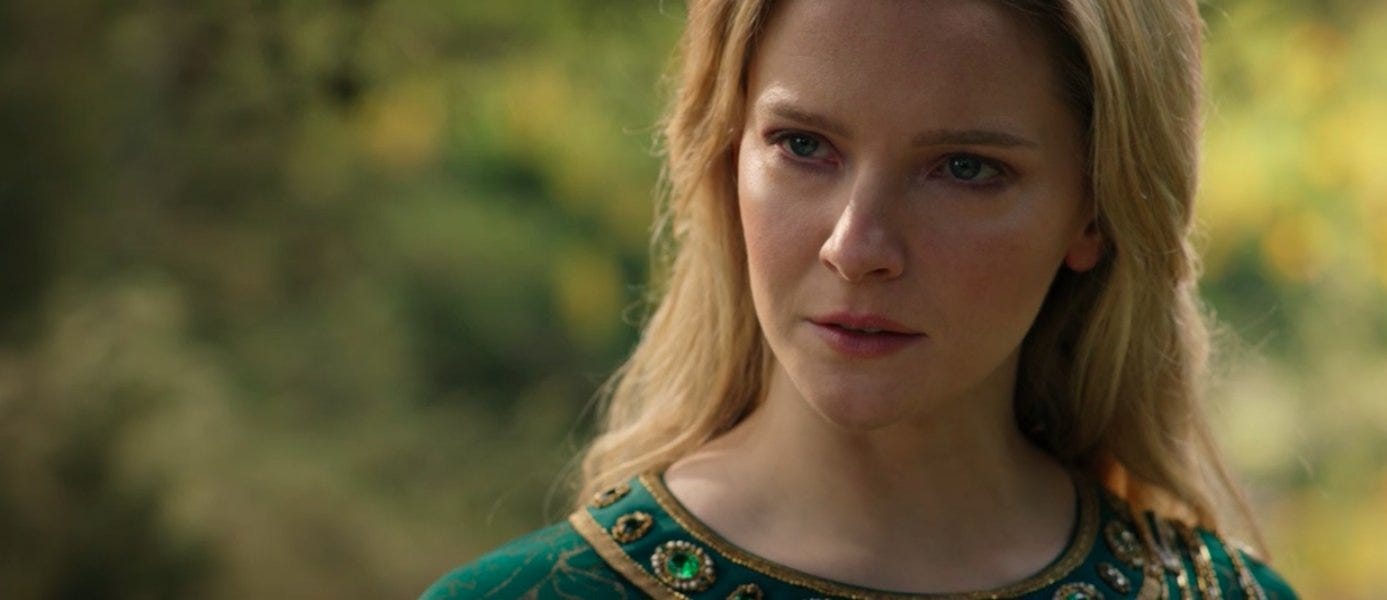
Turning once again to “The Sunne In Splendour”, here's how I touched upon it there: “It’s important to remember that Annatar, being a “messenger from the Valar” is not Halbrand, a scruffy and charming human refugee, so whatever triggers Galadriel to distrust Annatar in UT doesn’t apply to Halbrand. While in her single-mindedness in the pursuit of Sauron she doesn’t pick up right away that Halbrand may not be all that he seems, her trust and support of him has to be earned through their shared trials on the raft and her own research in Numenor’s Hall of Lore. When, after finally taking a moment to stop and breathe in the finale, she is triggered that something may be wrong, she immediately investigates and discovers the truth. And as soon as she confronts Halbrand with the results of her research and can see in his eyes and voice that he is indeed Sauron, she immediately goes for the kill, not in 200 years but in at most two minutes.” I promised back then to explore this statement in more detail in a future essay, and, well, here we are.
First of all, “Annatar, being a 'messenger from the Valar' is not Halbrand, a scruffy and charming human refugee, so whatever triggers Galadriel to distrust Annatar in UT doesn’t apply to Halbrand.” That doesn't need much more explanation. And to make the point even clearer, despite some theories and fears that the show was going to skip Annatar (since among other things, the name Annatar doesn’t appear in the Appendices, so it would have to require special permission from the Estate to use), we appear to be getting a fully-fledged Annatar storyline in Season 2. So, Halbrand is not Annatar, and Annatar is not Halbrand, even if ultimately both are disguises of Sauron. By that fact alone, Galadriel’s actions to the one cannot be the same as they are towards the other. Which does raise the question…why does she treat Halbrand the way she does, in a much nicer and friendlier fashion than book Galadriel treated Annatar? After all, as early as Episode 3 there are clear warning signs that he might actually be Sauron. Why then does Galadriel spend so much time with him and push him so hard to return to Middle-earth, even to assume a kingdom of his own? And what’s the deal with several moments that have provided so much fuel for fanfic writers? Can she not see that not all is as it seems with Halbrand?
Last question first; she can, in fact, see that not all is as it seems with Halbrand. Despite what you might have heard, Galadriel very much doesn’t trust him right away. And why would she? In the first five minutes of their acquaintance he sacrifices all his companions to a sea monster to save his own skin. Something that disgusts a noble soul like Galadriel, to the point that she stays as far away from him as possible on a raft not much bigger than that door frame which wasn’t big enough for Rose and Jack. Even after she sees the sigil on his pouch and presses him for more information, she's more inclined to join forces with him as an ally in war, a “companion by chance” as she describes him before the court at Armenelos, not as a trusted friend. And as late as that scene in Armenelos, her primary concern remains using him as a guide to return to the battlefield where she thinks her vocation lies. It takes three things to move their uneasy alliance to something resembling a friendship.
First, something noted by the 7 Stars, 7 Siblings and 1 White Tree podcast (it literally is seven siblings, sometimes all at once 🤣 ) in their episode reviewing the season as a whole: in a violent storm in Episode 2, Galadriel almost drowns. But Halbrand, the brooding and selfish lone wolf who wants nothing to do with her crusade, goes to severe risk to himself and saves her life. This clearly sticks, because later when Halbrand's charm wins them three days of mercy from Miriel, Galadriel explicitly asks how he could save her but still be content with three days away from saving the people of the Southlands.
Their conversation leads directly to the second point: in the course of begging Galadriel to let him try and find some peace, and urging her to seek it as well, Halbrand returns her dagger, which earlier Elendil had appropriated and Halbrand reclaimed via a public and abrupt hug. This act of selfless kindness, the first that Galadriel has experienced on Numenor (Elendil saved her life and Halbrand’s by drawing them from the sea, but at this point he is a cipher who may have an agenda; and everyone in Numenor is not exactly hiding their hostility, contempt for her bedraggled condition, and racism towards Elves) also clearly sticks and leaves her stunned. Maybe something else is at play (and there is a passionate subset of the RoP fandom that wants there to be something else) but I'll not get into that here.
Then we come to the third point. After realizing that Elendil is secretly an Elf-friend and can be trusted, Galadriel accepts his guidance to Numenor's Hall of Lore, where her sharp wits allow her to guess Sauron's plans for the Southlands based on new information about the mysterious sigil. But she also picks up something else, following up on a hunch that Halbrand is more than he claims (as she tells him to his face later in Episode 3 during their meeting in prison). Namely, that the seal on Halbrand's pouch, something that caught her eye almost from the beginning, is a royal coat of arms for the long-lost kings of the Southlands, the same area where she has learned Sauron wants to return and establish himself. From that point on she is committed to installing Halbrand, who she believes is the heir to this sigil and its corresponding royalty, as a king to save his people and assist in the struggle against Sauron. From that point, and only that point. This cannot be stressed enough. Far from the impulsive and uninformed choice some of her haters accuse her of making, she only overcame her initial distrust of Halbrand with time and thorough research, which led her to make the most informed military decision she could at the time.
Of course, there’s a problem. The line of the kings of the Southlands had died out centuries earlier. Something Galadriel only finds out much later, when the archives in Eregion reveal this rather important missing piece of information. Obviously the easiest explanation for this is "plot convenience." Which is true enough. But this sort of plot convenience is not without precedent. In The Fellowship of the Ring, Gandalf tells the Council of Elrond the story of how he came to realize that Bilbo’s magic ring was the One, and part of that story involves a visit to the archives of Minas Tirith and a scroll written by Isildur himself, wherein he writes how the Ring first came into his possession, its physical description, and why exactly he claimed it for his own. But this scroll had been lost for 967 years. Gandalf in TA 3017 had been the first person to even open it since King Earnur II, the last king of the House of Anarion, had gone to fight the Witch-king in 2050. And this isn't the first time this happens either. In UT's essay on the Palantiri, we learn that at some point, knowledge of where the stones had all turned up was lost to the Kings and Stewards. This contributed to them simply not using the stone they had in Minas Tirith, out of a fear that Sauron, the Witch-King of Angmar, or some other evil one had gotten his claws on the stone. Which makes Denethor's use of the stone all the more significant, as a testament both to his pride in his own strength and his desperation to protect his kingdom and people by any means in his power, even to the point of dealing with unknown powers with dangerous consequences. And then there's the matter of athelas. By the Third Age it was essentially only used as an air purifier in Gondor. For even the wise and skilled loremasters and doctors of Gondor had lost knowledge of its healing virtues, which only remained in children's rhymes. It would take the Ranger of Arnor Aragorn, long schooled by the Elves of Rivendell and long having only memory left as the heritage of his people, to show the Gondorians that athelas could be used as a potent medicine.
So Numenoreans and their descendents losing track of important pieces of information, such as the fate of a ruling house in the south of Middle-earth, is not unheard of. In fact, it makes a sort of sense, once we consider that in the show, at this stage Numenor is a more inward-looking, isolationist kingdom. Not the sort of place where new information about lands and kingdoms beyond its borders would be sought, and old information kept up-to-date. The question then arises...why did Galadriel wait so long to start looking for this information about the kings of the Southlands? Did nothing tip her off in Numenor that something was missing from the information she had there? Simply put...just as she is in Unfinished Tales, Galadriel in Rings of Power is a flawed and imperfect individual in the Second Age. Some flaws are just somewhat magnified in the show at the expense of others. One of which is her singlemindedness. This is not something the show conjured out of thin air. We have two separate instances where this comes into play in Unfinished Tales. First, in the immediate aftermath of the Kinslaying at Alqualonde: "...now she burned with desire to follow Fëanor with her anger to whatever lands he might come, and to thwart him in all ways that she could." If that isn't singlemindedness, I don't know what is. Then later, the essay on the Palantiri tells us that Galadriel and Gandalf were so focused on the struggle against Sauron, that they failed to notice both that Saruman was turning from simple jealousy of them to outright evil, and that he probably had a Palantir of his own. In the show, we see Galadriel's singleminded dedication to her crusade against Sauron manifest in how she tends to take whatever tool she can find and focus on how it can be used to bring down the Enemy, without perhaps asking herself all the questions she could.
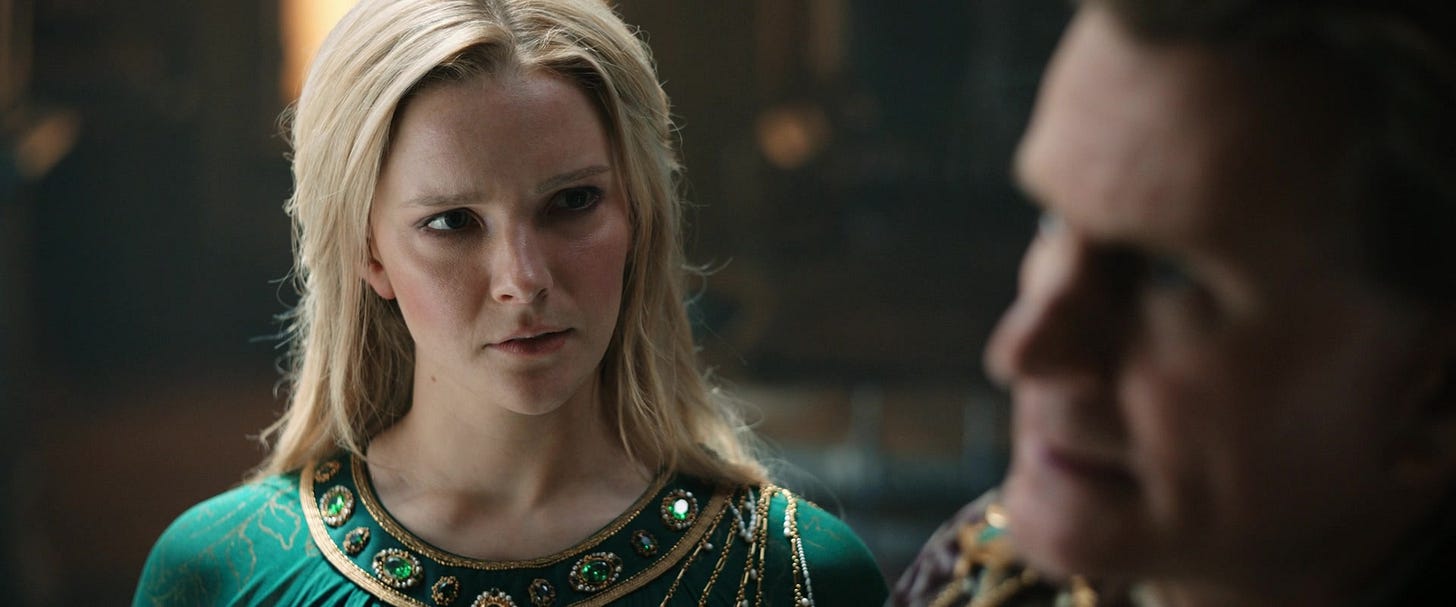
And it's crucial to note, that once the events of Episode 6 and 7 have humbled her and caused her to actually stop and think, her natural perceptiveness that's helped her in the past allows her to be triggered by something Celebrimbor says: his pleas to Gil-galad for more time to work with Halbrand to tap into powers of the Unseen Realm “not of the flesh, but over flesh” immediately remind her of something Adar had said during her interrogation of him, as he described Sauron’s actions and motivations in the far north that had lead to their separation. And equally crucially, once her suspicions are aroused she doesn’t push them to the side as a distraction from the “bigger issue” but immediately goes about trying to satisfy them by doing more research, and does her best to ensure that nothing can stop her; given Celebrimbor’s newfound obsession with Halbrand, the Elven librarian whom she turns to is instructed to keep things close to the vest until he finds something. And then, once she learns the truth, that the royal line had died out a thousand years ago, she wastes no time in taxing Halbrand with that fact; and when, with that horrifying statement about having “been awake since before the breaking of the first silence” she knows her enemy for who he is, she immediately draws steel and tries to settle the matter in that moment. Finally, when all that fails, A far cry from the Galadriel of UT, who may have been suspicious of Annatar from almost the beginning but, aside from perhaps a few angry looks, did...nothing about it for 200 years.
But the struggle against Sauron isn't the only thing Galadriel is interested in. There's also the matter of Halbrand's soul, and how she tries her hardest to save it. This is where her mercy and understanding comes into play. I don't believe that Galadriel ever loved Halbrand, because how could she? Throughout Season 1 her focus is on her crusade and how to accomplish it; romance was the farthest thing from her mind. And Celeborn still exists; we know that Elves mate for life, and when Galadriel speaks of him to Theo her eyes soften and sparkle in a way that they just don’t when she’s around Halbrand, “heavy breathing” moments notwithstanding. But there is something that she is drawn to in Halbrand: Mairon repentant before Eonwe, abjuring his evil deeds at the end of the War of Wrath and suing for pardon. That side of Sauron may have been pushed to the side as Eonwe informed him that he would still have to return to Valinor and face judgement, and in his shame and injured pride Sauron instead fled into the east. And in a way, he was still running by the time Galadriel ran into him on that raft. But there is still at least that potential for goodness and righteousness within Halbrand. And the more time Galadriel spends around Halbrand and the more she is able to learn about him, the more she can sense this potential for goodness, even if she can’t identify it exactly. This is in keeping with her character as we see it in the show; she may be focused on her mission sometimes to a dangerous degree, but Galadriel can see when people are hurting and will frequently take time out to try and help them. Her finest moment with Miriel comes not in her proud confrontations in the throne room, but in their quiet conversation at the tower where she empathizes with Miriel and urges her to “choose not the path of fear, but that of faith.” And did she have to take the time to talk with Isildur on the deck of their flagship, or to bare her soul to Theo on the long retreat back to friendly lines? No, but she saw that they were confused and hurting and went out of her way to provide comfort and good counsel; and in the case of Theo, this was done while Galadriel herself was wracked with pain and hurt and loss and regret.
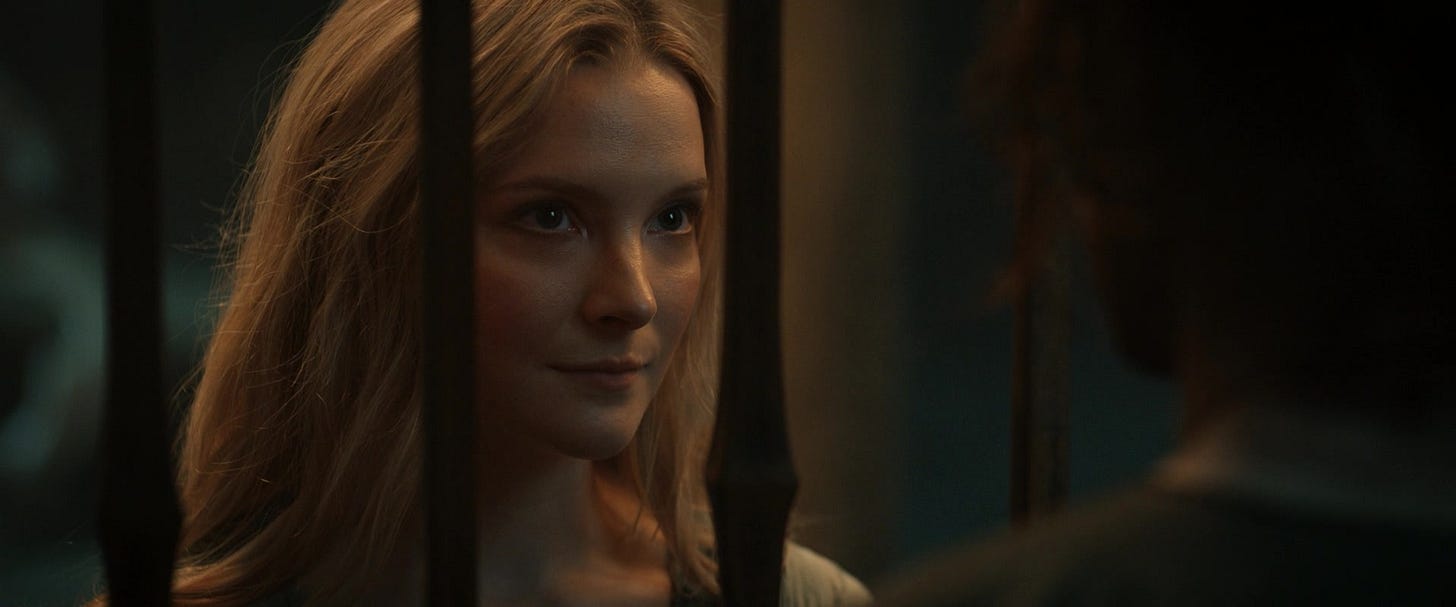
And Galadriel was not wrong about Halbrand. Yes, he was running from his past and wanted nothing to do with it. Yes, he was selfish, and sometimes scheming and violent; we need only see his selfishness when the raft is attacked by the “fish-dragon”, his savagery in his brawl in the streets of Armenelos, how openly selfish and avaricious he is in his desire to stay in Numenor, and how he nearly murders Adar in the aftermath of the E6 cavalry battle before Galadriel intervenes. But Mairon repentant before Eonwe is still there; it’s why he risked his own life to safe her from the sea, why he retrieved her dagger from Elendil for her, why he reacted with such contrition as she poured out her heart in the smithy in Episode 5, and why despite having a much more personal grievance against Adar he stops Galadriel from murdering the fallen elf in a fit of wrath. There remains some dispute as to how much Halbrand was actually repentant, and how much was him scheming and plotting and deceiving. But this doesn’t change the fact that there was some good left in Halbrand/Sauron, even if it may have been buried deep and was not easy for him to access. Galadriel sensed this, even if she couldn’t identify it explicitly, and spent the majority of the season trying to draw it to the surface. Ultimately she failed, but I believe that it’s better to try and fail than to not try at all. And it speaks well of her character that she listened to her better angels and sought not only to turn Halbrand into an ally in her own personal war but to help him find peace and save his soul.
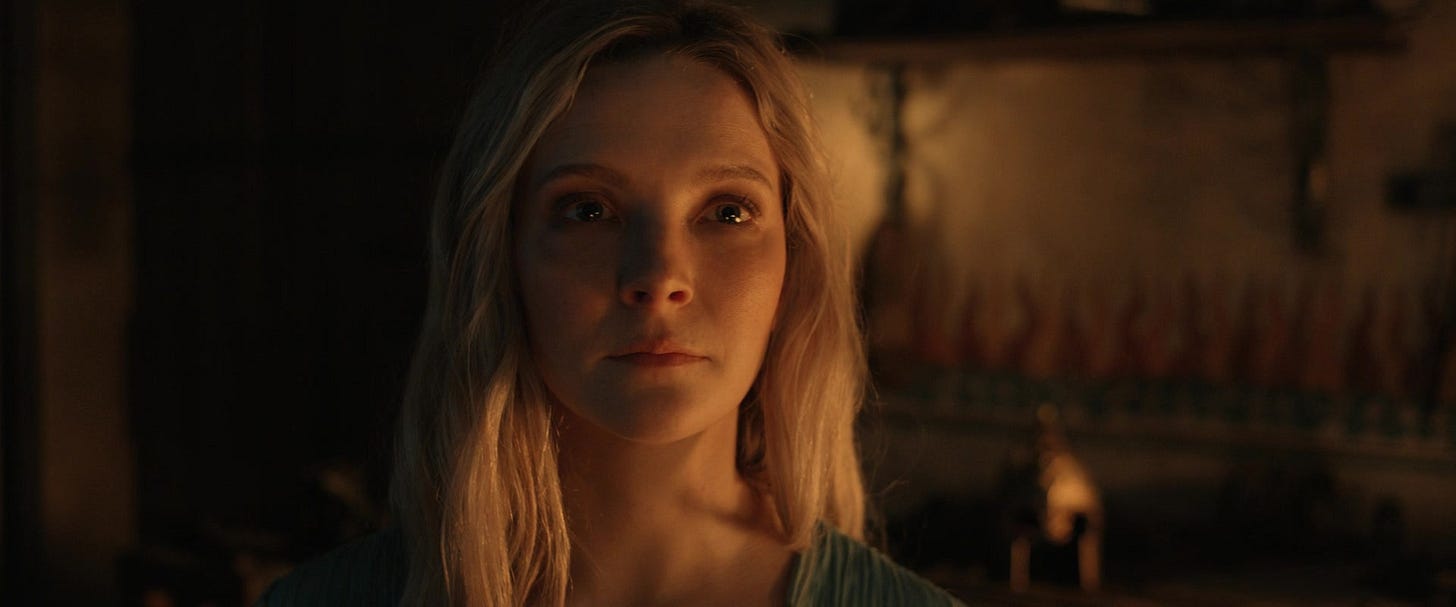
In summary, there is a clear difference in how RoP Galadriel and her UT counterpart interact with Sauron, and the show version comes off much better. UT Galadriel essentially saw in Annatar a flashing red light, but...did nothing about it. Aside from perhaps a few angry glances. A decision she and the other Elves of Eregion would come to rue in later years, even if its somewhat mitigated by the fact that she, just like the other Elves, only really learns the truth about Sauron when he forges the One and puts it on. Meanwhile, RoP Galadriel saw in Halbrand a stray cat, with a damaged past but the potential for a bright future, and she devoted herself to trying to help him realize this future, which also would bring her closer to winning her own war. And RoP Galadriel is able to learn the truth about this cat's true identity, in fairly short order, and immediately takes action to continue the fight against him. For while we don’t know what role UT Galadriel had in the Three Rings not being destroyed when they perhaps should have, show Galadriel urges that Three Rings be forged because of the inevitability of war with Sauron and the desire to use whatever means are available to ensure that the Elves will be able to remain in Middle-earth to resist him.
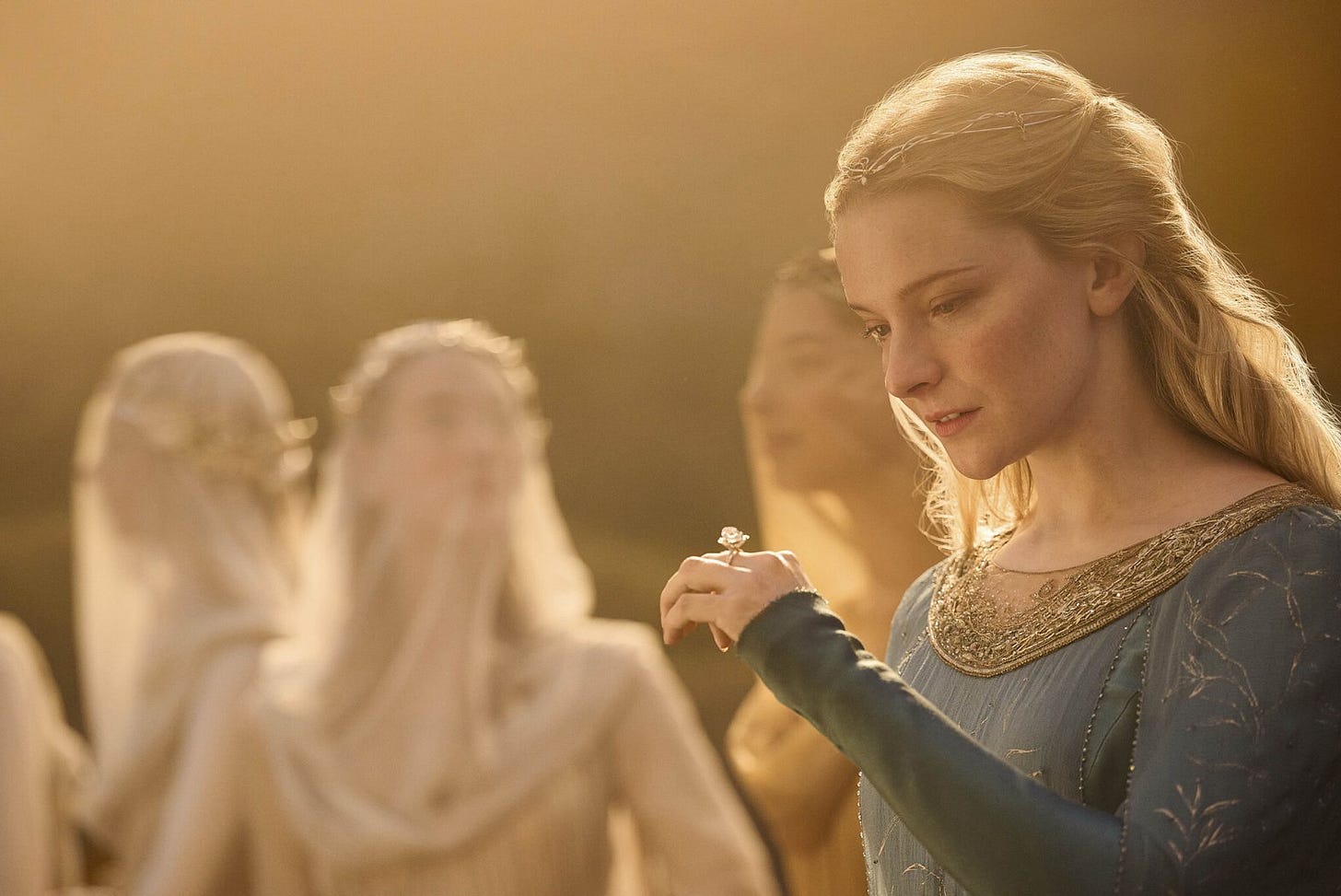
Now, if you’ve gotten this far, you might be thinking, “Well said, well argued. But there’s still the question of the consequences of Galadriel’s actions. No matter how much better she behaved towards Sauron overall in the show than in the text of UT, how much more clearly defined and more noble her actions are, she’s still responsible for bringing Sauron back to Middle-earth, specifically to the part of the world that had been explicitly set aside for him as a new base. Maybe, in her insistence and her badgering, she’s even responsible for for turning him back to evil, in a way.” And I'll concede one thing right up front. In Rings of Power, Galadriel is indeed the one who brings Sauron back to Middle-earth. But there are a few things that mitigate how much we should damn her. First of all, remember that Galadriel in UT is guilty of essentially the same thing. By not following the example of Gil-galad and expelling Annatar from Eregion, she gave him time to ingratiate himself with Celebrimbor and the smiths and thus begin the work of forging the rings, culminating in the One. Because, let's not forget, in UT it is Galadriel who rules in Eregion, not Celebrimbor. The decision to let Sauron enter the realm, and then stay there, for 200 years was hers alone. And unlike show Galadriel, we don’t even know why Galadriel did this, which would have such dire consequences for all of Middle-earth down the road.
In contrast, we know why Galadriel in RoP brings Halbrand to Middle-earth: to use him as an ally in the struggle against the heirs of Morgoth, and to give him the opportunity to find peace and save his soul. As far as she knew, she wasn't bringing Sauron back to Middle-earth, but Halbrand back to his inheritance where he could do good not only for all Middle-earth, but for himself as well. When in E7 she consoles Theo not to blame himself for yielding the cursed hilt to Adar which triggered the eruption of Mount Doom, because "the Wise look also to what is in our hearts", she may as well have been speaking about herself. Her heart was pure, her intentions good and noble. Perhaps indeed this is why Galadriel was thrown into Halbrand’s path in the first place. Not only for his benefit (more on that later), but for her own as well, to give her the opportunity to do something other than desperately focus on the destruction of Sauron no matter the cost. A chance for Galadriel to fall back upon the better side of her nature and actually remember the “noble and generous spirit” she is. Just as her interactions with Miriel, Elendil, Isildur and Theo gave her the chance to put aside the politician and soldier and to be the friend, the counsellor, and the light. She did not turn turn away from the opportunity to be a light for any of them, and neither did she spurn the chance to be one for Halbrand, even if ultimately he chose not to accept it.
Let's return to the idea of "what is in our hearts," specifically to Halbrand’s heart. Because some people claim that had Galadriel simply left Halbrand alone in Numenor, he would have been content simply to be Halbrand the smith. I don't think this is a realistic assumption. Because while Mairon repentant isn't gone yet when the two arrive in Numenor, he's not alone. Oh no. Sauron is there too; I’ve already mentioned how we can see when he projects his own envy and jealousy onto Galadriel in the streets of Armenelos, how he’s almost as interest in selfish advancement as he is in his personal peace, and how savage he is while brawling with the tradesmen in the streets. Without Galadriel being around to draw out and encourage the goodness in Halbrand, the evil that his long service to Morgoth had brought in would have almost certainly come back to the forefront. Halbrand the smith would have only been the premature beginning of a new evil journey. And when that journey resumes with Ar-Pharazon bringing Sauron as a hostage to Numenor, we know how it ends, with the mightiest kingdom of men drowned forever and the Blessed Realm withdrawn from the physical world. Imagine how more evil could have been done to the world if Sauron had more time, and had a head start? So, while Galadriel bringing Sauron back to Middle-earth will definitely cause great trouble and calamity in later seasons, as we know just from the trailer for Season 2, just leaving him alone on Numenor would have been so much worse.
And Galadriel is not responsible for turning Sauron back to evil. That idea assumes that Halbrand was wholly good, Mairon fully returned, and that Galadriel’s actions towards him were selfish and shortsighted. But at the risk of repeating myself: that's not the case. Sauron is still there in Halbrand; and Galadriel, while still focused on her mission, is altruistic enough to see that Mairon is there and to try and draw it out. He had so many opportunities of responding positively to the grace that Galadriel offered him, and there were many times where he came close. As indeed Miriel, Elendil, Isildur and Theo responded positively to the mercy and grace that Galadriel showed them. Perhaps if any number of exterior forces had not intervened, Galadriel’s grace could have had time to work in Halbrand. That it could not is no mark against Galadriel offering her grace, but in Halbrand, for whatever reason, choosing to be Sauron when push came to shove. At the moment Galadriel cast the scroll of the Southland kings at Halbrand's feet, he had a choice, perhaps his last chance. Mairon, or Sauron? And he chose Sauron; if indeed he hadn’t already made that choice, perhaps in response to Mount Doom’s eruption impressing upon him a sense of fatalism and resignation, or the wonders of Celebrimbor’s forge giving him the opportunity. She did not force him to make that choice, he did it himself, of his own free will. And later in this very scene Galadriel defying him in the Unseen Realm and rejecting his was not his trigger that turned him back to evil. He had already turned by that point; all his sob-stories about the iron grip of Morgoth, and his offer to ally Galadriel’s light with his power, are all in the service of his ambition to save, or rather rule, Middle-earth. All that was within Galadriel's power to do was to join him, or to defy him. And to her eternal credit, she chose to fight on. Even as the Enemy screamed in her face that “Sauron lives because of you!”; one of his many lies, Sauron lives because Sauron chose to live.
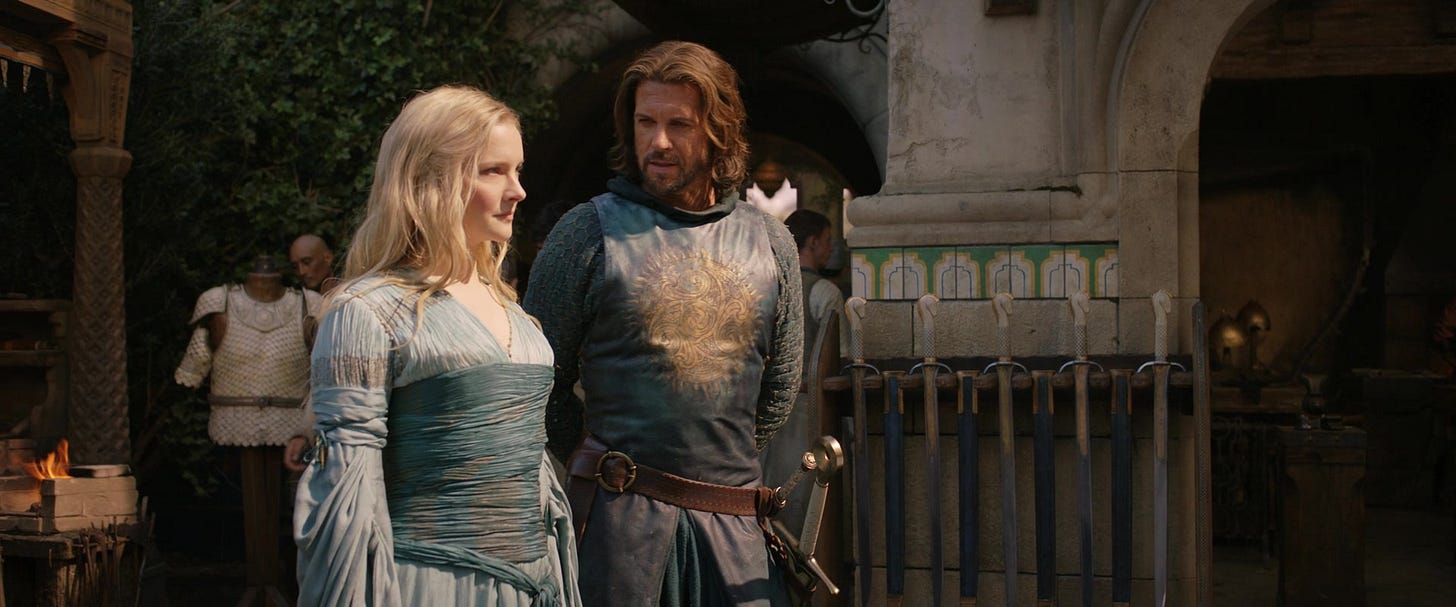
And let's not forget, Sauron isn't the only person whom Galadriel brings back to Middle-earth. Numenor returns too. More specifically, Elendil. He may be a petty lord now, but we know that he will be the father of a mighty dynasty. Galadriel may have been more interested in saving Halbrand's soul, but as I’ve mentioned previously, she is also inadvertently responsible for helping Elendil return to his faith, and take the first steps in his own journey that will lead to his heroic death in bringing about Sauron's second great defeat. While she doesn’t have anything with Elendil in quite the same fashion as the in-depth, deeply personal heart-to-hearts that she has with Miriel, Isildur and Theo, she does have something else…lots and lots of time with him. Starting with how Elendil first dragged her and Halbrand out of the sea; he may protest to Miriel that “the Sea put her in my path, and the Sea is always right,” but he still had the choice whether to listen to the Sea, or rather to the One who created the Sea. And he had many other chances to choose whether to stand with Galadriel, to listen to her voice, or to stand aside and shut her out. Ultimately, despite the events of the season leading him to what he thinks is an unimaginable loss, he does not abandon his newfound faith; and we know that he will in a way be rewarded, not only with a crown in Middle-earth but with a sort of martyr’s crown beyond the circles of the world. And more directly, Galadriel is directly responsible for saving the Southlanders from all falling prey to the genocidal designs of Adar, and for setting them up to find a new home. The survivors will go on to found a new home at a place called Pelargir. By extension, this small colony of refugees will no doubt end up forming the heart of Gondor, the longest lasting of the Realms in Exile and the mightiest of all Mordor's foes. "Even in her waning, Gondor is still strong," Boromir will say later, and he is right. So Galadriel is indirectly, to varying degrees, responsible for putting on the board two of the pieces that will ultimately result in Sauron's greatest and final defeat: the father of the dynasty that would give us Aragorn the King, and the Kingdom that guarded against him for centuries and finally rejoiced in his downfall. So in her initial design she did succeed, from a certain point of view. It will take a little while, nearly two ages, for final victory both against Sauron and for Galadriel, but we know how this ends. And we can see in Season 1 of Rings of Power a plausible vision for how this began.

I would like to end by hearkening back to the beginning of days, to the Music of the Ainur where Eru Iluvatar and the Valar sang the world into being. Into this symphony Melkor, the Great Enemy, in his pride and lust for power introduced his own discordant melody, and essentially silenced the other Ainur. But not Eru, who counter-attacked with his own song of power and thus restored some semblance of what his plan had looked like initially. Melkor had twisted Eru’s original vision, but the Almighty had been able to assert his will in the end. “And thou, Melkor, shalt see that no theme may be played that hath not its uttermost source in me, nor can any alter the music in my despite. For he that attempteth this shall prove but mine instrument in the devising of things more wonderful, which he himself hath not imagined.” The Almighty has a plan, no matter what evils his fallen children freely choose. They may hinder or frustrate or slow down Providence, but they cannot stop it. Sauron may strive to set himself up as the heir of Morgoth, but the choices he makes will ultimately result in him being nothing more than an angry cloud, scattered by a great wind from the West. And Galadriel? Well, she has a role to play too. And in no small measure, her actions in response to the events she found herself facing helped make her even more capable and worthy of her status as a heroic leader in the struggle against Sauron. She was able to remember who she is, a noble, merciful and understanding ray of light, and seizes many opportunities to exercise these virtues and make them even more a part of herself. So perhaps, we should be able to see what Galadriel is actually doing, how she is actually growing and changing, how she is showing mercy and understanding even to those who don’t accept it, and afford her some mercy and understanding of our own. It would do us some good. After all, as Portia told Shylock, mercy is an attribute of God himself.


All images ©2022, Amazon Studios, unless otherwise noted.




